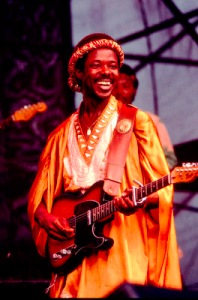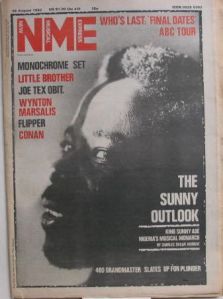
Zouk la Sé Sél Médikaman Nou Ni – Kassav
Kijan zot fé
M’pa ka konpran’n
Zot ka viv’ kon si
Pa ni pwoblém’
Poutan zot sav’
Lavi la réd
Kijan zot fé
Pou pé sa kenbé
It’s french-caribbean patois – in this case from the island of Guadeloupe. The song came past my ear sometime in late 1987, just before my girlfriend Rita Wolf and I embarked on our epic two-month trip around India. Where did I hear it? In Sterns record shop where I used to hang out browsing and listening to new sounds – mainly from Africa, for by now I was hooked on African Pop Music thanks to a chance encounter with Franco & TPOK Jazz from Congo (see My Pop Life #38 – Liberté) and Sterns would always have the latest records. It was a vinyl shop, although they had a few tape cassettes too, and some T-shirts. I had been basically mining (colonial imperial verb) the Congo sound from this point.

I’d bought Sound D’Afrique volumes one & two, released by Island records way back in 1982. Thrilling stuff. Overlapping guitar lines, horns which cross the bar lines, light melodic vocals, irresistible beats. The bigger names (to the European consumers of which I was one) were Pablo from Congo and Etoile De Dakar which was Youssou N’Dour‘s first band from Senegal. My favourite song was from Cameroon, still one of my favourite African tracks by Moussa Doumbia, on this LP :

The 2nd Sound D’Afrique LP was subtitled “Soukous” which was the name of the musical hybrid played in the Congo at that time, and listened to and danced to right across the African continent. Those two LPs were an introduction to African Pop via Island Records – and although I’d already found my own way there (see the blog link to Liberté) I trusted that they had found some good sounds for me to follow, some breadcrumb trails for me to chase down. I’d heard M’bilia Bel in Sterns (see My Pop Life #180 Boya Ye) and bought the song, and a fantastic Regine Feline song from Gabon, still soukous. This new song in my ear sounded like all of these.

Then there were the WOMAD LPs too – from Europe and Asia as well as Africa. I wrote about discovering Asha Bhosle in My Pop Life #67 – Yun Na Thi.

WOMAD = World of Music Arts and Dance and was created by Peter Gabriel and a host of friends in 1982. The resulting commemorative LP I have discussed due to finding it explosively stimulating and opening all kinds of doors from Mighty Sparrow (My Pop Life #4 – Music & Rhythm) to the Drummers of Burundi (whom Malcolm McLaren had “been inspired by” with Adam Ant & Bow Wow Wow). The term the music industry started to use was World Music. A new shelf in Virgin, Our Price or HMV, sometimes divided into countries, often all together. My OCD & spectrum brain immediately located a problem. What is World Music ? Is it – as the industry claimed – “anything that wasn’t Western rock & pop & soul” which meant from the UK or the USA? It was easy to file African Pop country by country even as the music crossed boundaries, as music is wont to do. But, said my brain, what about Scottish traditional music, or Irish music. Is that World Music too? The first WOMAD festival would say yes, of course, because there were Peter Hammill, The Beat, Echo & The Bunnymen and The Chieftains at that legendary gathering. But who cares right ? World Music is now seen as a racist phrase by some guardians of righteousness, and the new phrase Global Music has replaced it. Sounds like another marketing event to me.

Back in Sterns I was a bit stoned and this song came on which made the whole shop twitch and dance and me explode with mirth around the ellipsis…
Zouk-la c’est seule medikaman nou ni Ca con sa !
At least that’s how I spelled it (see above). I understood the chorus right away – Zouk is the only medicine we need. But what was Zouk now ? Soukous’ godson? I bought the LP on the spot it was this one :

…by Georges Decimus and Jacob Desvarieux and blow me down if it wasn’t African at all but from the Caribbean. Tiny mind blown – one more line crossed, one more mystery explained. The diaspora. The cross-fertilisation continued back and forth across the Atlantic just as it had with the blues and then the British invasion in the sixties (except without the slavery), and the Congo > Cuba > Congo > Guadeloupe !
Their band, the mighty Kassav’ was formed in Guadeloupe by Jacob Desvarieux and Pierre-Edouard Decimus (who later brought his brother Jacob into the band) with a conscious desire to create a form of music which combined Pierre-Eduard’s roots & knowledge of more traditional French Caribbean music : Haitian kompas, beguine and gwoka from Guadeloupe, Dominican merengue with African soukous. These sounds would all coalesce in Paris and Guadeloupe (which, like Martinique is a departément of France and sends MPs to Parliament and is indeed a caribbean part of the EU) and Kassav’ was formed. They called the music ZOUK. The LP I bought was a solo duet from two of the members, but the song appears on numerous Kassav’ LPs. Later I would buy Jocelyn Berouard‘s Siwo from the same year. They are still going strong, and play around the world.

What was it that turned this white boy onto African Pop, to World Music, to soukous & zouk & bossa nova & rai ? Drugs, yes. Of course. An endless limitless curiosity of the ear. New sounds, new singers. Criss-cross rhythms that explode with happiness as Teddy Osei of Osibisa once said. And I never identified with being white, or English, or anything really. I resent official forms which ask for which ethnicity you are. I always put “human”. I mean. Do you believe in segregation OR NOT?

In late 1987 I had the world at my feet, and I don’t mean the music, I mean as an actor and a writer. I just didn’t know it. I had no strategy, no wisdom, no publicist. There were also forces to contend with. I had been going out with Rita for two years and we were quite feisty within our loving. We’d planned this huge trip to India which felt to me like a voyage of discovery with long train journeys and new experiences, and to Rita was that plus visiting relatives and finally, in Calcutta / Kolkata – her mother. I’d met Mrs Ghose in Swiss Cottage, but she’d chosen to spend the winter back in West Bengal and who knows when she would return. So Rita and I were both looking forward and being expectant of a break from normal in slightly different ways. But we both needed to get away. Rita had been on tour with Joint Stock Theatre Company – the play Sanctuary which I’d written after a wonderful workshop earlier in the year (see My Pop Life #86 I Know You Got Soul) and My Pop Life #156 Paid In Full) and while she’d been on tour around the UK I’d done a film with Phil Collins called Buster about the Great Train Robbery, where I’d played Ronnie Biggs*. We were both exhausted.
*Really I should have had a publicist even back then no? LOL
Little did I know how exhausting India would be. For another post. But my diary from November 1987 (precious, burbling whinge that it is) does at least record all the music which I LOVED back then, and this song was a major event. Also from this era – Alpha Blondy, the discovery of rai from Algeria and Salif Keita from Mali another rich delicious source of sound.

These people are challenging my translation !
What is strange though is that within 9 months of this purchase I would have my first date with Jenny Jules who would later become my wife, my one true love. No disrespect to Mumtaz, or Rita, but she is the one, the final one. The one. And little did I know until recently that Jenny’s family also owned this song (along with another WOMAD song Prince Nico M’Barga‘s Sweet Mother an absolute classic coming soon to the blog) and played it at parties. French patois indeed was her parents’ language, since they are both from St Lucia which changed hands over the colonial period no less than 13 times. St Lucians are conversant in both English and French as a result. If you’re not familiar with the language, French patois is a little like Jamaican patois is to English. IF you stop trying to translate it and just listen it becomes clearer (to me at least). So when I first spent time with her parents later on around their house in Wembley, they would speak patois to each other and I heard the word “culottes” which I immediately translated OUT LOUD like an idiot as “knickers“.
The shock reverberated across North London. Gens Blanc can speak patois !@#!?! Well not quite. But he can speak French, and with a little help from Kassav’ – the Guadeloupe band that Jacob and George & Pierre-Edouard formed – I could find my way through some of what was said. Imagine.
The song opens with a five-chord fanfare then a deep but laid-back carib voice suggests “Envoie“.
Send it.
the original track from 1984 :
and
Live from 2019 !!



 It was splashed all over the NME front page and could hardly be missed. On the Mango label, produced by Frenchman Martin Meissonnier and very definitely aimed at the western market, (at me!) it’s a brilliant record, a showstopper, showcasing Ade’s trademark Nigerian juju rhythms with a slight electro tinge. His best songs, usually 20 minutes long in their Nigerian context, are here shortened and sweetened, but not too much. The key component is the talking drum, held under the arm and squeezed, you can change the note of the drumbeat. So-called because they have been used as communication tools in West Africa for forever. As a musical instrument they are thrilling. I have one ! The other unexpected element is the beautifully evocative slide guitar. The production is immaculate and the whole package was a winner. I’ve chosen a beautiful song Ma Jaiye Oni to represent his juju beat.
It was splashed all over the NME front page and could hardly be missed. On the Mango label, produced by Frenchman Martin Meissonnier and very definitely aimed at the western market, (at me!) it’s a brilliant record, a showstopper, showcasing Ade’s trademark Nigerian juju rhythms with a slight electro tinge. His best songs, usually 20 minutes long in their Nigerian context, are here shortened and sweetened, but not too much. The key component is the talking drum, held under the arm and squeezed, you can change the note of the drumbeat. So-called because they have been used as communication tools in West Africa for forever. As a musical instrument they are thrilling. I have one ! The other unexpected element is the beautifully evocative slide guitar. The production is immaculate and the whole package was a winner. I’ve chosen a beautiful song Ma Jaiye Oni to represent his juju beat.

